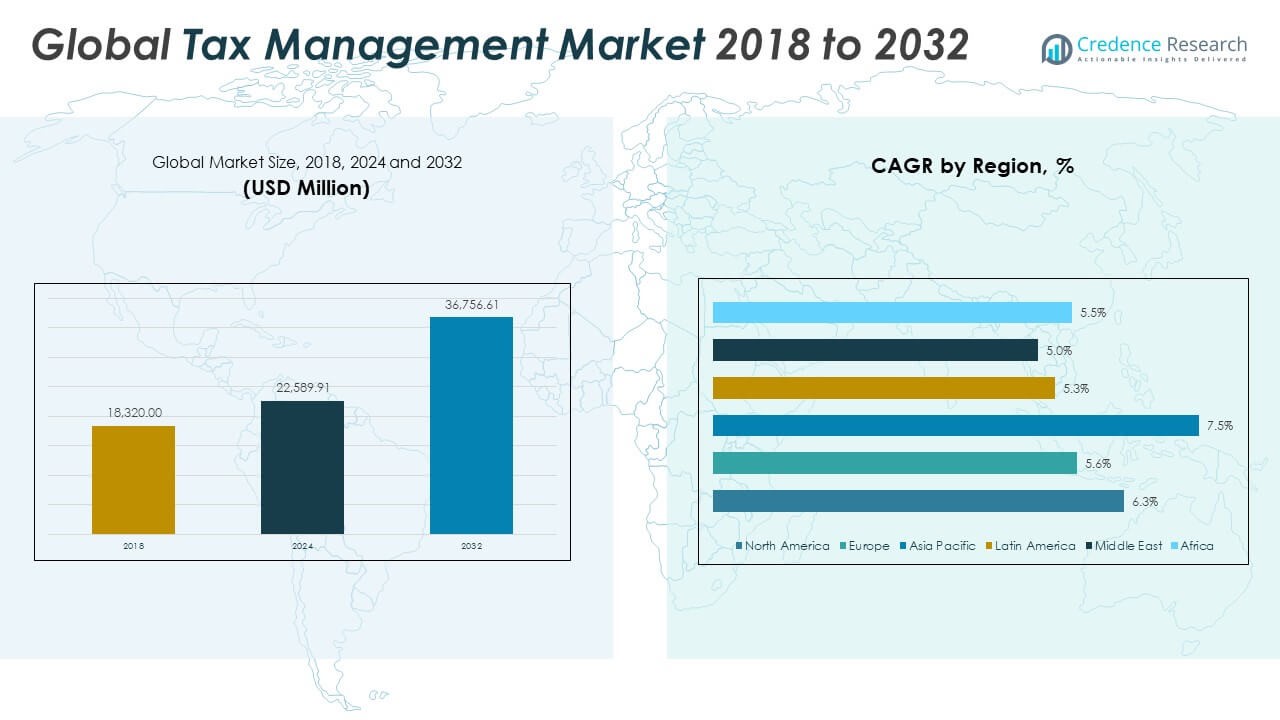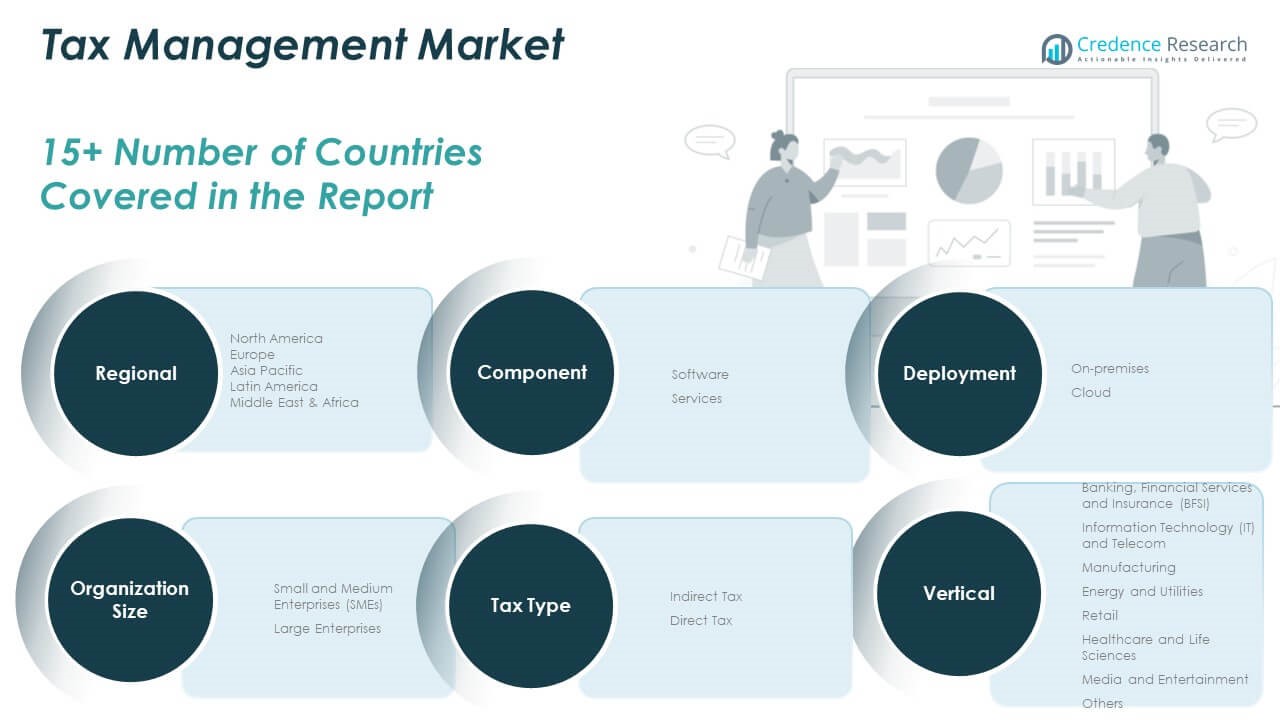CHAPTER NO. 1 : GENESIS OF THE MARKET
1.1 Market Prelude – Introduction & Scope
1.2 The Big Picture – Objectives & Vision
1.3 Strategic Edge – Unique Value Proposition
1.4 Stakeholder Compass – Key Beneficiaries
CHAPTER NO. 2 : EXECUTIVE LENS
2.1 Pulse of the Industry – Market Snapshot
2.2 Growth Arc – Revenue Projections (USD Million)
2.3. Premium Insights – Based on Primary Interviews
CHAPTER NO. 3 : TAX MANAGEMENT MARKET FORCES & INDUSTRY PULSE
3.1 Foundations of Change – Market Overview
3.2 Catalysts of Expansion – Key Market Drivers
3.2.1 Momentum Boosters – Growth Triggers
3.2.2 Innovation Fuel – Disruptive Technologies
3.3 Headwinds & Crosswinds – Market Restraints
3.3.1 Regulatory Tides – Compliance Challenges
3.3.2 Economic Frictions – Inflationary Pressures
3.4 Untapped Horizons – Growth Potential & Opportunities
3.5 Strategic Navigation – Industry Frameworks
3.5.1 Market Equilibrium – Porter’s Five Forces
3.5.2 Ecosystem Dynamics – Value Chain Analysis
3.5.3 Macro Forces – PESTEL Breakdown
3.6 Price Trend Analysis
3.6.1 Regional Price Trend
3.6.2 Price Trend by product
CHAPTER NO. 4 : KEY INVESTMENT EPICENTER
4.1 Regional Goldmines – High-Growth Geographies
4.2 Product Frontiers – Lucrative Product Categories
4.3 Tax Type Sweet Spots – Emerging Demand Segments
CHAPTER NO. 5: REVENUE TRAJECTORY & WEALTH MAPPING
5.1 Momentum Metrics – Forecast & Growth Curves
5.2 Regional Revenue Footprint – Market Share Insights
5.3 Segmental Wealth Flow – Component & Tax Type Revenue
CHAPTER NO. 6 : TRADE & COMMERCE ANALYSIS
6.1. Import Analysis by Region
6.1.1. Global Tax Management Market Import Revenue By Region
6.2. Export Analysis by Region
6.2.1. Global Tax Management Market Export Revenue By Region
CHAPTER NO. 7 : COMPETITION ANALYSIS
7.1. Company Market Share Analysis
7.1.1. Global Tax Management Market: Company Market Share
7.2. Global Tax Management Market Company Revenue Market Share
7.3. Strategic Developments
7.3.1. Acquisitions & Mergers
7.3.2. New Product Launch
7.3.3. Regional Expansion
7.4. Competitive Dashboard
7.5. Company Assessment Metrics, 2024
CHAPTER NO. 8 : TAX MANAGEMENT MARKET – BY COMPONENT SEGMENT ANALYSIS
8.1. Tax Management Market Overview by Component Segment
8.1.1. Tax Management Market Revenue Share By Component
8.2. Software
8.3. Services
CHAPTER NO. 9 : TAX MANAGEMENT MARKET – BY TAX TYPE SEGMENT ANALYSIS
9.1. Tax Management Market Overview by Tax Type Segment
9.1.1. Tax Management Market Revenue Share By Tax Type
9.2. Indirect Tax
9.3. Direct Tax
CHAPTER NO. 10 : TAX MANAGEMENT MARKET – BY VERTICAL SEGMENT ANALYSIS
10.1. Tax Management Market Overview by Vertical Segment
10.1.1. Tax Management Market Revenue Share By Vertical
10.2. Banking, Financial Services and Insurance (BFSI)
10.3. Information Technology (IT) and Telecom
10.4. Manufacturing
10.5. Energy and Utilities
10.6. Retail
10.7. Healthcare and Life Sciences
10.8. Media and Entertainment
10.9. Others
CHAPTER NO. 11 : TAX MANAGEMENT MARKET – BY DEPLOYMENT SEGMENT ANALYSIS
11.1. Tax Management Market Overview by Deployment Segment
11.1.1. Tax Management Market Revenue Share By Deployment
11.2. On-premises
11.3. Cloud
11.4. Hybrid
CHAPTER NO. 12 : TAX MANAGEMENT MARKET – BY ORGANIZATION SIZE SEGMENT ANALYSIS
12.1. Tax Management Market Overview by Organization Size Segment
12.1.1. Tax Management Market Revenue Share By Organization Size
12.2. Small and Medium Enterprises (SMEs)
12.3. Large Enterprises
CHAPTER NO. 13 : TAX MANAGEMENT MARKET – REGIONAL ANALYSIS
13.1. Tax Management Market Overview by Region Segment
13.1.1. Global Tax Management Market Revenue Share By Region
13.1.2. Regions
13.1.3. Global Tax Management Market Revenue By Region
13.1.4. Component
13.1.5. Global Tax Management Market Revenue By Component
13.1.6. Tax Type
13.1.7. Global Tax Management Market Revenue By Tax Type
13.1.8. Vertical
13.1.9. Global Tax Management Market Revenue By Vertical
13.1.10. Deployment
13.1.12. Global Tax Management Market Revenue By Deployment
13.1.13. Organization Size
13.1.14. Global Tax Management Market Revenue By Organization Size
CHAPTER NO. 14 : NORTH AMERICA TAX MANAGEMENT MARKET – COUNTRY ANALYSIS
14.1. North America Tax Management Market Overview by Country Segment
14.1.1. North America Tax Management Market Revenue Share By Region
14.2. North America
14.2.1. North America Tax Management Market Revenue By Country
14.2.2. Component
14.2.3. North America Tax Management Market Revenue By Component
14.2.4. Tax Type
14.2.5. North America Tax Management Market Revenue By Tax Type
14.2.6. Vertical
14.2.7. North America Tax Management Market Revenue By Vertical
14.2.8. Deployment
14.2.9. North America Tax Management Market Revenue By Deployment
14.2.10. Organization Size
14.2.11. North America Tax Management Market Revenue By Organization Size
14.3. U.S.
14.4. Canada
14.5. Mexico
CHAPTER NO. 15 : EUROPE TAX MANAGEMENT MARKET – COUNTRY ANALYSIS
15.1. Europe Tax Management Market Overview by Country Segment
15.1.1. Europe Tax Management Market Revenue Share By Region
15.2. Europe
15.2.1. Europe Tax Management Market Revenue By Country
15.2.2. Component
15.2.3. Europe Tax Management Market Revenue By Component
15.2.4. Tax Type
15.2.5. Europe Tax Management Market Revenue By Tax Type
15.2.6. Vertical
15.2.7. Europe Tax Management Market Revenue By Vertical
15.2.8. Deployment
15.2.9. Europe Tax Management Market Revenue By Deployment
15.2.10. Organization Size
15.2.11. Europe Tax Management Market Revenue By Organization Size
15.3. UK
15.4. France
15.5. Germany
15.6. Italy
15.7. Spain
15.8. Russia
15.9. Rest of Europe
CHAPTER NO. 16 : ASIA PACIFIC TAX MANAGEMENT MARKET – COUNTRY ANALYSIS
16.1. Asia Pacific Tax Management Market Overview by Country Segment
16.1.1. Asia Pacific Tax Management Market Revenue Share By Region
16.2. Asia Pacific
16.2.1. Asia Pacific Tax Management Market Revenue By Country
16.2.2. Component
16.2.3. Asia Pacific Tax Management Market Revenue By Component
16.2.4. Tax Type
16.2.5. Asia Pacific Tax Management Market Revenue By Tax Type
16.2.6. Vertical
16.2.7. Asia Pacific Tax Management Market Revenue By Vertical
16.2.8. Deployment
16.2.9. Asia Pacific Tax Management Market Revenue By Deployment
16.2.10. Organization Size
16.2.11. Asia Pacific Tax Management Market Revenue By Organization Size
16.3. China
16.4. Japan
16.5. South Korea
16.6. India
16.7. Australia
16.8. Southeast Asia
16.9. Rest of Asia Pacific
CHAPTER NO. 17 : LATIN AMERICA TAX MANAGEMENT MARKET – COUNTRY ANALYSIS
17.1. Latin America Tax Management Market Overview by Country Segment
17.1.1. Latin America Tax Management Market Revenue Share By Region
17.2. Latin America
17.2.1. Latin America Tax Management Market Revenue By Country
17.2.2. Component
17.2.3. Latin America Tax Management Market Revenue By Component
17.2.4. Tax Type
17.2.5. Latin America Tax Management Market Revenue By Tax Type
17.2.6. Vertical
17.2.7. Latin America Tax Management Market Revenue By Vertical
17.2.8. Deployment
17.2.9. Latin America Tax Management Market Revenue By Deployment
17.2.10. Organization Size
17.2.11. Latin America Tax Management Market Revenue By Organization Size
17.3. Brazil
17.4. Argentina
17.5. Rest of Latin America
CHAPTER NO. 18 : MIDDLE EAST TAX MANAGEMENT MARKET – COUNTRY ANALYSIS
18.1. Middle East Tax Management Market Overview by Country Segment
18.1.1. Middle East Tax Management Market Revenue Share By Region
18.2. Middle East
18.2.1. Middle East Tax Management Market Revenue By Country
18.2.2. Component
18.2.3. Middle East Tax Management Market Revenue By Component
18.2.4. Tax Type
18.2.5. Middle East Tax Management Market Revenue By Tax Type
18.2.6. Vertical
18.2.7. Middle East Tax Management Market Revenue By Vertical
18.2.8. Deployment
18.2.9. Middle East Tax Management Market Revenue By Deployment
18.2.10. Organization Size
18.2.11. Middle East Tax Management Market Revenue By Organization Size
18.3. GCC Countries
18.4. Israel
18.5. Turkey
18.6. Rest of Middle East
CHAPTER NO. 19 : AFRICA TAX MANAGEMENT MARKET – COUNTRY ANALYSIS
19.1. Africa Tax Management Market Overview by Country Segment
19.1.1. Africa Tax Management Market Revenue Share By Region
19.2. Africa
19.2.1. Africa Tax Management Market Revenue By Country
19.2.2. Component
19.2.3. Africa Tax Management Market Revenue By Component
19.2.4. Tax Type
19.2.5. Africa Tax Management Market Revenue By Tax Type
19.2.6. Vertical
19.2.7. Africa Tax Management Market Revenue By Vertical
19.2.8. Deployment
19.2.9. Africa Tax Management Market Revenue By Deployment
19.2.10. Organization Size
19.2.11. Africa Tax Management Market Revenue By Organization Size
19.3. South Africa
19.4. Egypt
19.5. Rest of Africa
CHAPTER NO. 20 : COMPANY PROFILES
20.1. Aldrich Services LLP
20.1.1. Company Overview
20.1.2. Product Portfolio
20.1.3. Financial Overview
20.1.4. Recent Developments
20.1.5. Growth Strategy
20.1.6. SWOT Analysis
20.2. Anrok, Inc.
20.3. Asure Software, Inc.
20.4. Avalara, Inc.
20.5. Avantax, Inc.
20.6. Canopy Tax, Inc.
20.7. Crowe LLP
20.8. Drake Software, LLC
20.9. Ernst & Young Global Limited
20.10. Global Tax Management, Inc.
20.11. HRB Digital LLC
20.12. Intuit, Inc.
20.13. Jackson Hewitt Tax Service Inc.
20.14. JPMorgan Chase & Co.
20.15. KPMG International Limited
20.16. PricewaterhouseCoopers LLP
20.17. Quaderno
20.18. Sage Group PLC
20.19. SAP SE
20.20. Tax Management Associates, Inc.
20.21. Taxback International
20.22. TaxCloud by The Federal Tax Authority, LLC
20.23. TaxSlayer LLC
20.24. Thomson Reuters Corporation
20.25. Vertex, Inc.





